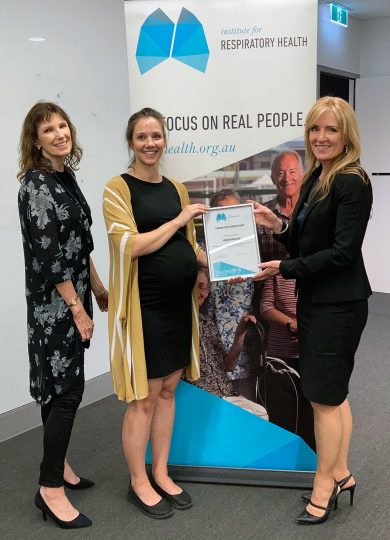Calorie intake research could improve quality of life for people with cystic fibrosis

and Wendy Endebrock-Brown (right) members of the
Conquer CF Committee
A Conquer CF research study is exploring how the calorie needs for those with cystic fibrosis changes when they are healthy and when they have a lung infection with the aim of finding the ideal nutritional plan to support living a full life.
Jordan Henderson, a clinical dietitian and researcher, who works at the WA Adult Cystic Fibrosis Centre at Sir Charles Gairdner Hospital, received research funding from Conquer CF to fund a study that could be life-changing for adults aged 18 and older.
“We already know that people with cystic fibrosis need more energy to breathe and because of poor digestion. But they also need more calories to fight lung infections and to keep their lungs and body strong,” said the researcher.
“We currently don’t know what the optimum level of calories should be – it’s going to be different for everyone.”
Presently calorie needs of a patient with cystic fibrosis are estimated by a clinician by looking at their weight, age and sex. However, research shows that these methods can result in errors. This could mean that a patient isn’t receiving the ideal amount of nutrition and their lung health and wellbeing can be negatively affected.
“Our research will use indirect calorimetry, which is a more accurate way of measuring energy use and consequently we’re aiming to improve the way we determine how many calories our patients need.
“If we can identify this, we can tailor a nutrition plan for the patient which ensures they’re receiving enough energy when they are unwell. This will help to fight infections and reduced the impact of lung disease.”
The four-year study also hopes to identify the barriers to achieving optimum calorie levels.
“We’re aware of many of the barriers already,” said Jordan.
“Cystic fibrosis patients can have symptoms such as a poor appetite, nausea and side effects from the medication they’re on. And the thick, sticky mucus that their body produces makes it hard to absorb fat and nutrients, meaning they often need to eat more and take vitamins and digestive enzymes to maintain good nutrition and healthy lung function.
“It’s also important to consider other issues such as obesity, as weight gain can be a side effect from certain medications. We’re going to look at several barriers in a patient’s history to explore what impact they might have.
“Once we’ve identified the ideal calorie intake for a patient, we will use this to ensure we’re delivering the best outcomes with the nutrition plan that we design for patients to support optimal quality of life.”